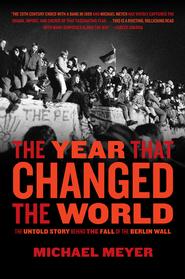
When he traveled to Berlin in 1987, President Ronald Reagan said famously, “Mr. Gorbachev, tear down this wall.” And while the United States certainly played an important role in the end of the Cold War, there were other (arguably more significant) factors at work. In his book The Year that Changed the World: The Untold Story of the Fall of the Berlin Wall (Simon & Schuster, 9/09), author Michael Meyer ’74 contends that domestic resistance movements and certain key figures within the USSR at the time – in particular Hungarian Prime Minister Miklós Németh – were the true impetuses behind the fall of communism in Eastern Europe. In so doing, Meyer rejects the “common knowledge” interpretation of Cold War history and uncovers hitherto-undervalued people, events, and perspectives.
According to the publisher, “On the twentieth anniversary of the fall of the Berlin wall, Michael Meyer provides a riveting eyewitness account of the collapse of communism in Eastern Europe that brilliantly rewrites our conventional understanding of how the Cold War came to an end and holds important lessons for America's current geopolitical challenges.”
Between 1988 and 1992, Meyer was Newsweek's bureau chief for Germany, Central Europe and the Balkans. He is currently director of communications in the executive office of the Secretary-General at the United Nations.
According to the publisher, “On the twentieth anniversary of the fall of the Berlin wall, Michael Meyer provides a riveting eyewitness account of the collapse of communism in Eastern Europe that brilliantly rewrites our conventional understanding of how the Cold War came to an end and holds important lessons for America's current geopolitical challenges.”
Between 1988 and 1992, Meyer was Newsweek's bureau chief for Germany, Central Europe and the Balkans. He is currently director of communications in the executive office of the Secretary-General at the United Nations.
Posted January 22, 2010
